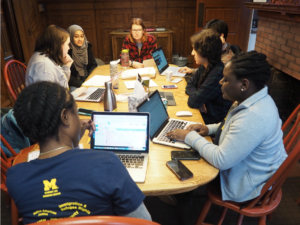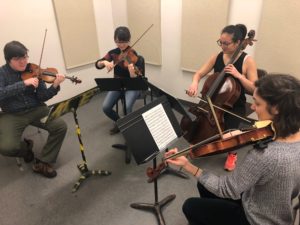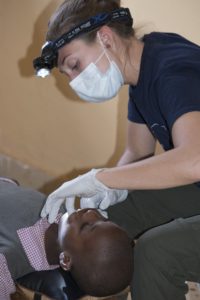
Last year’s day when everyone gathered at the Ginsberg Center and found out where they were going.
The classrooms are empty, but University of Michigan students are still learning, engaging and serving during spring break this week.
Hundreds are opting to immerse themselves in communities throughout the world, recharging from their busy school schedules and making a positive impact.
Katrina Lovett, a recent graduate from the dental hygiene program, chose to spend her spring break in Meru, Kenya, last year.
Together with a group of nine other students from the School of Dentistry, she taught kids basic oral hygiene and performed preventive dental treatments, like cleaning, sealing and applying fluoride.
“This trip will always be one of my greatest accomplishments,” Lovett said. “It never once felt like a job even though we spent hours preparing for our trip, provided treatment all day while there, and did essays when we got back.”
Breann Edwards, a senior biology major from Fenwick, Michigan, was a site leader for Asian Youth Services in Chicago, during spring break last year. She tutored at-risk youth in an after-school program that aims to foster academic success and overall well-being.
“Without doing [alternative spring break], I wouldn’t have figured out that I was so passionate about public health,” she said. “I have grown so much as a person throughout this organization and I highly recommend it to anyone interested in social justice or even just learning more about what social justice means, and what it means to be an active citizen in our communities.”
This year, U-M students are spending their spring breaks advancing public health on the U.S.-Mexico border, teaching theater in South Africa, developing business plans in Traverse City and volunteering all over the map.
Classical music in a nontraditional setting

Students of the Ethos String Quartet practicing to perform inside state prisons during this spring break. Image credit: Fernanda Pires
Students of the Ethos String Quartet will perform together at three state prisons in Michigan. The student musicians want to give the prisoners the opportunity to hear and learn about music that may be unfamiliar to them.
Violinists Nathaniel Cornell and Chihiro Kakishima, violist Ali Friedman and cellist Cecilia Sha will play classical music and conduct question-and-answer sessions and interactive activities with inmates.
The students say it is important to explore what music can accomplish beyond entertainment in nontraditional settings and how people can engage these practices in challenging contexts.
“We also want to promote a sense of community through a shared listening experience,” said Friedman, a Master of Social Work student. “And to encourage empathy and understanding between outside community members and inmates.”
These spring break experiences support the students’ academic achievement and shape their professional growth.
Lovett, the dental hygiene student, now works in a pediatric office, while studying to apply

Students from the School of Dentistry taught kids in Kenya basic oral hygiene and performed preventive dental treatments, like cleaning, sealing and applying fluoride. Image credit: Global Initiatives in Oral and Craniofacial Health
to the state Public Dental Prevention Program, which allows dental hygienists to collaborate with dentists and provide services to underserved populations in Michigan.
“I never thought I wanted to work with children until I went on this trip,” she said. “And in the near future, I can continue to give back. I already started going to local schools to do dental education days.”
Dentistry professor Carlos González-Cabezas has taken students like Lovett to Kenya for nine years. He says the benefits to the community and the students are lasting.
“This experience has the deepest impact in their years of training,” said González-Cabezas, director of Global Initiatives in Oral and Craniofacial Health. “As a result of the experience, several of the alumni of the program have chosen to work in pediatric dentistry serving low-income children.”
A few examples of what U-M students are doing during the break:
School of Public Health: Through the Public Health Action Support Team program, 11 SPH students are working on a variety of projects in south Texas that will help advance and support the work being conducted to better understand health challenges faced by communities on the U.S.-Mexico border.
School of Education: Partnered with the nonprofit 826Chi in Chicago, students are helping elementary and junior high students with after-school tutoring and writing.
The Ginsberg Center: This year, Ginsberg has 21 trips planned, involving more than 200 students. Trips are organized by topic, such as health care and disability, food justice, criminal justice and LGBTQ awareness.
School of Music, Theatre and Dance: Students are in South Africa for a cross-cultural theater initiative.
Taubman College of Architecture and Urban Planning: This year, 250 architecture and urban planning students are taking advantage of a special volunteer externship called Spring Break Connections.
Ross School of Business: Hundreds of MBA students are in different parts of the country and world working on their Multidisciplinary Action Projects.The MAP experience is designed to help students sharpen their analytical, project management and leadership skills. In addition, students in the Sustainable Business in Iceland class will conduct research and action-based fieldwork in Iceland.
School of Information: About 40 SI students are working around the country, in Detroit, Chicago, Florida and California.
School of Dentistry: Students are in Kenya and Guatemala this year.


